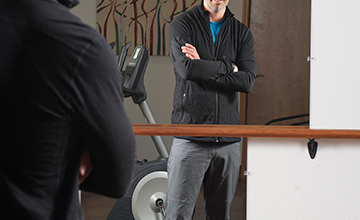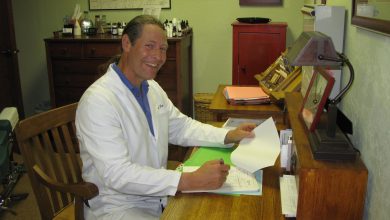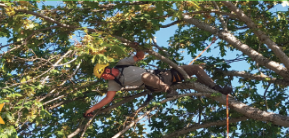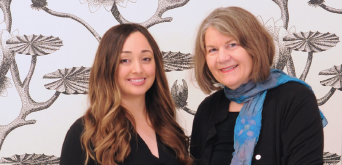Geos Institute – Creating Climate Change Solutions
Located in Ashland, Oregon the Geos Institute works to make human and natural communities whole in the face of climate change. They create science-based climate change solutions through three initiatives focused on forests, rivers, and communities. Climate Wise® helps local leaders and communities, Forest Legacies focuses on forest and land managers, and Working Waters provides assistance to water managers. Together these initiatives work here in southern Oregon, in the Pacific Northwest, across the nation, and into the international arena. Having just celebrated its 10 year anniversary, the Geos Institute is entering 2017 committed to keeping the U.S. on track to meet its global climate responsibilities while developing on-the-ground climate solutions that work.
In today’s interview I spoke with Board President, Ken Crocker, to learn more about the great work they are doing.
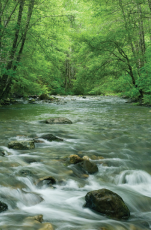 Ken thanks for taking the time to do this interview today in the LocalsGuide. We have been following along with your monthly columns and it seems that you guys are doing some very important and interesting work.
Ken thanks for taking the time to do this interview today in the LocalsGuide. We have been following along with your monthly columns and it seems that you guys are doing some very important and interesting work.
Yes, it’s both urgent and very interesting work, which is why I love serving on the Board. The global movement to address the climate crisis is growing daily. It’s really exciting to see how people are working around the world to reduce global warming pollution and deal with the impacts we are already seeing. Geos Institute’s work strengthens this movement by helping leaders make climate change decisions that are good for nature and people over the long-term.
In the last couple of years all three of our initiatives have had the opportunity to work in southern Oregon and we’ve really enjoyed the chance to focus on projects close to home. As we have done this local work, we’ve realized that many of our neighbors don’t know what we do! So, we’re reaching out to the community through our monthly column to share our work.
 Ashland continues to amaze and surprise me as we continue to meet interesting community members whose work is far reaching and making big changes in the world.
Ashland continues to amaze and surprise me as we continue to meet interesting community members whose work is far reaching and making big changes in the world.
Yes, our program staff are amazing people. I really look forward to attending Board meetings because I always learn so much. Several of our staff members are recognized experts in their fields and are influencing much larger efforts than might be expected from a relatively small organization based in Southern Oregon.
Ken to begin with I would love for you to introduce us to the Geos Institute staff.
Certainly. Tonya Graham is not only the Executive Director of the Geos Institute, she’s also a national leader in community-based climate adaptation. She recently contributed to a new report “Climate Adaptation: The State of Practice in U.S. Communities.” She was responsible for coordinating the first national gathering of adaptation practitioners in 2012 with the Kresge Foundation and is co-leading an effort to create a nation-wide system of climate adaptation services for towns like Ashland.
Dominick DellaSala runs our Forest Legacies initiative. He’s written extensively in scientific journals and recently published global assessments on the world’s quickly disappearing primary (unlogged) forests and roadless areas featured in Science magazine. He works with scientists and conservation organizations around the globe to draw attention to the role intact forests play in helping to stabilize runaway climate change. If there is a strategy room on high level forest management issues, that’s where you’ll find Dominick.
Cathy Kellon runs our Working Waters initiative and has been restoring Pacific Northwest watersheds for 15 years. She leads a unique collaboration between federal land management agencies, state agencies, and community water managers called the Drinking Water Provider Partnership. The Partnerships help water managers use watershed restoration to meet water supply and quality challenges made worse by climate change. Groups in the southeastern U.S. are looking to create a similar partnership in their region
Marni Koopman is a pioneer in climate change adaptation. She’s been instrumental in bringing environmental concerns into community-based adaptation processes and is a primary architect of Whole Community Adaptation – a planning framework that helps local leaders reduce their risks from climate change in ways that are collaborative, scientifically sound, equitable, and nature-based. She also serves on the City of Ashland’s Climate and Energy Action Plan Ad Hoc Committee.
Jessica Leonard creates computer maps and graphs to tell the story of climate change. Eight years ago the Geos Institute was one of the first organizations to make complex climate model data easy to understand for local leaders. That first project took three months! Since then, Jessica has created automated processes that analyze the same amount of data in less than a week, which helps us get climate change projections into the hands of local leaders so they can make better decisions.
Our program staff are supported by Patricia Johnson, Christina Mills, and Geoff Weaver who offer key contributions to the initiatives.
How did the Geos Institute originally come to be and what are the key tenants of the work you are doing?
The Geos Institute was born from a merger of programs from the World Wildlife Fund’s Klamath-Siskiyou office and Headwaters in 2006. That transition helped us really think about the course we wanted to chart going forward and we decided to work in the systems (forests, rivers, and community adaptation planning) where the decisions made will have large, ripple impacts for people and nature.
Our vision is a world where decision-makers in these three systems routinely choose strategies that strengthen environmental and community systems and endure well into the future. To reach that vision, our team publishes and translates climate change science for decision-makers, builds partnerships to showcase on-the-ground solutions, and guides leaders in making ecologically sound climate change decisions.
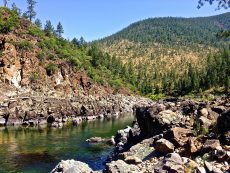 The Geos Institute is comprised of three key initiatives. Can you please re-introduce us to those?
The Geos Institute is comprised of three key initiatives. Can you please re-introduce us to those?
Sure. Our initiatives focus on the three systems we believe have the greatest potential for long-term climate change solutions: forests, rivers, and communities
Forests are the nation’s first line of climate change defense. This is because forests are nature’s “cooling towers,” absorbing vast quantities of carbon dioxide from the atmosphere and helping to slow down runaway climate change. They are also nature’s “water towers,” storing and gradually releasing clean water, especially during dry summer months when water is most precious. Where they are intact (free of roads and logging), forests are a refuge for countless plants and wildlife that need a safe haven in a changing climate. Our Forest Legacies initiative works to ensure that forests are managed to stabilize the climate and help wildlife, plants, and people adapt to climate change impacts. For example, we contributed to a report estimating the emissions from logging state and private lands in Oregon. We estimated those emissions to be the equivalent to over 2 million vehicles each year! The findings led Oregon Governor Kate Brown to form the nation’s first task force on forest carbon as a subcommittee of the state’s Global Warming Commission.
Clean water is the common denominator across all communities. A warming climate is having devastating effects on rivers, particularly in the West where we rely on snowpack to melt gradually over the summer. As snowmelt decreases and storms become larger, water managers are finding it increasingly difficult to guarantee safe supplies of drinking water and fish and wildlife are also feeling the stress. How water managers solve these problems matters, especially if they reach primarily for concrete, steel, and chemicals for solutions. Our Working Waters initiative helps municipal water managers look to watershed restoration solutions to meet these increasingly difficult water challenges. In 2016 – the very first year of our Drinking Water Providers Partnership, we were able to help fund 11 restoration projects that will improve community water supplies and fish habitat across Oregon. Most of these were new working partnerships between public water systems and conservation groups.
Some of the most important decisions about how we respond to climate change are made at the local level as community leaders grapple with climate change impacts that are hitting different parts of the community at the same time. Those decisions have important consequences for ecosystems and vulnerable people, like low-income and elders. Unfortunately, local government decision-making is often isolated with one department creating its own solutions without considering the impact of those decisions on other departments. Sometimes those “solutions” actually end up making the problems worse. And while there are many climate adaptation resources floating around on the internet, local leaders have no way of knowing what planning approach to take or how to navigate and understand climate data. Our ClimateWise initiative helps communities across the U.S. create adaptation solutions that are equitable and strengthen natural systems.
The Geos Institute is very unique in its approach to creating change because you are working on both a local and global level. Please say more.
That can be a bit confusing because organizations are usually identified as local, regional, national, or international. We work on systems and when you do that, there is work to be done at all levels. Our three initiatives are focused on transforming how we manage forests and watersheds and how we make adaptation decisions in our communities. Those are big goals and certainly too large for one group to manage on its own. Creating this level of change requires that we work with others to make the case for why it needs to happen, remove obstacles and create incentives, support innovators in the system who are willing to make the change, and showcase real world examples so people can see that it works. In each of our initiatives we match up what we do best with what is needed within the larger strategy and we work extensively with partner organizations to fill in the gaps. We do what needs to be done to move our initiatives forward – sometimes that’s local work, often it’s regional or national, and every now and then it’s international.
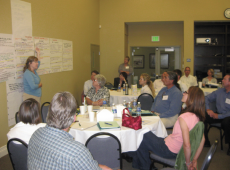 Ken please tell us more about what makes the Geos Institute one of a kind.
Ken please tell us more about what makes the Geos Institute one of a kind.
What has always attracted me to the Geos Institute is the strategic vision and dedication of the staff and board. We face enormous challenges around climate change and Geos Institute’s goals are appropriately sized to make a real difference. At the same time, the staff is very pragmatic and they make really good use of strategic partnerships. I like that they are experts in their fields, which is an important piece of what makes them so effective. The Institute’s vision is long-term, but once we achieve those goals, we will have done something very significant. We enjoy the punctuated victories along the way, of course, but we are all in it for the long haul. When I leave Board meetings, I know we are making real progress and I feel hopeful.
How do you see the Geos Institute continuing to grow over the next five years?
Demand for assistance to address climate change at the local level and within the water management world is surging and our programs are growing to keep up with that demand. Our ClimateWise initiative is working with partners to scale up and provide adaptation services to communities nation-wide. Our Working Waters initiative is bringing a scientist on staff to develop a research agenda that asks the questions water managers need answered about how well watershed restoration works for municipal systems and what it costs. Our Forest Legacies initiative is working nationally and internationally to gain support for managing the world’s primary forests for carbon and biodiversity. With such strong leaders at the helm of the initiatives, I am excited by what the next five years will bring for the organization.
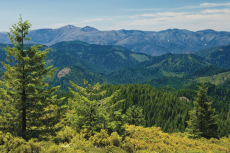 What support does your organization need to accomplish these goals?
What support does your organization need to accomplish these goals?
Our work is supported by individuals, foundation grants, and contracts. Of these, individual donors offer the most flexible support, which is very helpful especially when an unanticipated obstacle, or opportunity, presents itself. One of the greatest challenges in keeping a nonprofit organization’s doors open and the staff focused on its mission is that foundation funders like to provide support for just a few years before moving on to another organization or issue. That support is great for launching programs, but other funding sources, especially individuals, are needed to keep those programs moving forward over the long-term.
Being at the forefront of climate change preparedness, what are some things that are exciting to see happening?
There is a growing awareness of the role forests play in fighting climate change and the impacts climate change is having on water. People are on the move working to address climate change locally and they are sharing what they are learning with each other much more openly than they used to. And, the excitement that we are finding in rural Oregon for restoration-based techniques for water management is very heartening. Work to combat climate change and adapt to its effects is happening in communities large and small across the country. The genie is out of the bottle and at this point, she doesn’t look to be going back in any time soon no matter who is in the White House and Congress.
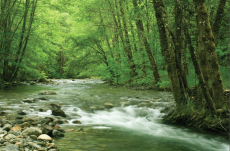 What’s the next step that our readers can take to learn more and stay in touch with the Geos Institute?
What’s the next step that our readers can take to learn more and stay in touch with the Geos Institute?
We publish several e-newsletters for our initiatives and the Geos Institute as a whole. Your readers can sign up for any or all of those e-newsletters by visiting our website: www.geosinstitute.org. They can also follow us on Facebook and Twitter. Scientists can sign up for our Scientist Network and we have specific needs for volunteers with scientific or business development expertise.
Learn More:
Geos Institute
84 Fourth Street Ashland, OR 97520
541.482.4459
www.geosinstitute.org

